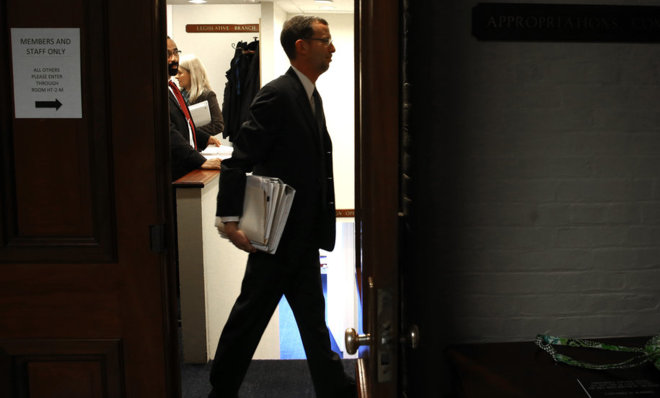Open source the CBO!
The economists at the Congressional Budget Office aren't magicians — and there's no good reason why they shouldn't reveal how they perform their tricks


A free daily email with the biggest news stories of the day – and the best features from TheWeek.com
You are now subscribed
Your newsletter sign-up was successful
The Congressional Budget Office (CBO), as a nonpartisan group tasked with producing "scores" (a sort of predictive economic analysis) of the macroeconomic and budget impact of congressional bills, is one of the most politically important parts of our government.
All politicians rely on CBO scores to trumpet the cost benefits of their own bills or to lacerate their opponents over deficit-expanding price tags. CBO scores get cited in the media as gospel, and they can powerfully shape legislation and its chances of becoming law. For example, an enormous part of the ObamaCare debate was devoted to the cost of the bill — the cost as modeled by the CBO, over a certain period of years, according to certain assumptions. Certain parts of the bill were deliberately crafted to achieve the right CBO score. (Larry Elder helpfully recounts the ObamaCare-CBO saga here.)
But how did the CBO know the fiscal impact of ObamaCare 10 years from now? Well, to forecast that with any certainty, the CBO would have to know the GDP 10 years from now, and the tax policy 10 years from now, and other critical factors. Of course, it's literally impossible to do these things. Which is why the CBO builds mathematical models with all sorts of assumptions into them that spit out a "score." Like pretty much all predictors of future things, the CBO has to do some (educated) guesswork. And indeed, in the case of ObamaCare, the task is so difficult that the CBO basically gave up earlier this year.
The Week
Escape your echo chamber. Get the facts behind the news, plus analysis from multiple perspectives.

Sign up for The Week's Free Newsletters
From our morning news briefing to a weekly Good News Newsletter, get the best of The Week delivered directly to your inbox.
From our morning news briefing to a weekly Good News Newsletter, get the best of The Week delivered directly to your inbox.
This is not to criticize the CBO or its work. While the efficacy of mathematical modeling in economics is overrated, it is also necessary. It is impossible to do this kind of forecasting without building certain assumptions into it.
It's good that we have the CBO, and it's good that it does the work it does. But there is an easy way to make it better.
Right now, the CBO's work is essentially a black box. The CBO spits out the "score," but nobody knows anything about the model that score is based on.
Like any model, the CBO's is built on questionable assumptions. As I said, that is a necessary part of the work. But it would also be helpful to the public to have the ability for other people to use different, equally legitimate assumptions and to put them into the CBO's model to get a different score.
A free daily email with the biggest news stories of the day – and the best features from TheWeek.com
It's just common sense. We should open source the CBO so that as many people as possible can look into the innards of its scores and arrive at their own conclusions, and perhaps debate other scores. The CBO's model isn't intrinsically better than anybody else's — it's just the CBO's.
As far as I can tell, there is only one even mildly legitimate objection to this: If people could peek behind the curtain, the CBO's scores would lose their authoritativeness. We would be lost in a quagmire of alternate realities where one party touts the Heritage model's figures and another party touts the Center for American Progress model's figures.
But this line of thinking is, frankly, unworthy of a democracy. The very fine people at the CBO are not magicians. And a democracy does not just pretend that economic forecasters are wizards, because otherwise our public debate will break down. Think tanks are already quite adept at producing questionable figures, and when they do, those figures are questioned. The problem is not that questionable figures are produced, the problem is that it's a lot harder than it needs to be for the public to question the CBO's figures.
The CBO does important work. So important, that others should be able to understand it, and add to it.
Pascal-Emmanuel Gobry is a writer and fellow at the Ethics and Public Policy Center. His writing has appeared at Forbes, The Atlantic, First Things, Commentary Magazine, The Daily Beast, The Federalist, Quartz, and other places. He lives in Paris with his beloved wife and daughter.
-
 One great cookbook: Joshua McFadden’s ‘Six Seasons of Pasta’
One great cookbook: Joshua McFadden’s ‘Six Seasons of Pasta’the week recommends The pasta you know and love. But ever so much better.
-
 Scientists are worried about amoebas
Scientists are worried about amoebasUnder the radar Small and very mighty
-
 Buddhist monks’ US walk for peace
Buddhist monks’ US walk for peaceUnder the Radar Crowds have turned out on the roads from California to Washington and ‘millions are finding hope in their journey’
